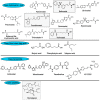Epigenetic Regulation of TRAIL Signaling: Implication for Cancer Therapy
- PMID: 31248188
- PMCID: PMC6627638
- DOI: 10.3390/cancers11060850
Epigenetic Regulation of TRAIL Signaling: Implication for Cancer Therapy
Abstract
One of the main characteristics of carcinogenesis relies on genetic alterations in DNA and epigenetic changes in histone and non-histone proteins. At the chromatin level, gene expression is tightly controlled by DNA methyl transferases, histone acetyltransferases (HATs), histone deacetylases (HDACs), and acetyl-binding proteins. In particular, the expression level and function of several tumor suppressor genes, or oncogenes such as c-Myc, p53 or TRAIL, have been found to be regulated by acetylation. For example, HATs are a group of enzymes, which are responsible for the acetylation of histone proteins, resulting in chromatin relaxation and transcriptional activation, whereas HDACs by deacetylating histones lead to chromatin compaction and the subsequent transcriptional repression of tumor suppressor genes. Direct acetylation of suppressor genes or oncogenes can affect their stability or function. Histone deacetylase inhibitors (HDACi) have thus been developed as a promising therapeutic target in oncology. While these inhibitors display anticancer properties in preclinical models, and despite the fact that some of them have been approved by the FDA, HDACi still have limited therapeutic efficacy in clinical terms. Nonetheless, combined with a wide range of structurally and functionally diverse chemical compounds or immune therapies, HDACi have been reported to work in synergy to induce tumor regression. In this review, the role of HDACs in cancer etiology and recent advances in the development of HDACi will be presented and put into perspective as potential drugs synergizing with TRAIL's pro-apoptotic potential.
Keywords: TRAIL; cancer; chromatin remodeling; histone deacetylase (HDAC); histone deacetylase inhibitors (HDACIs); methylation; silencing; tumor necrosis factor (TNF).
Conflict of interest statement
The authors declare no conflict of interest.
Figures











Similar articles
-
HDACs and HDAC Inhibitors in Cancer Development and Therapy.Cold Spring Harb Perspect Med. 2016 Oct 3;6(10):a026831. doi: 10.1101/cshperspect.a026831. Cold Spring Harb Perspect Med. 2016. PMID: 27599530 Free PMC article. Review.
-
Using Histone Deacetylase Inhibitors to Analyze the Relevance of HDACs for Translation.Methods Mol Biol. 2017;1510:77-91. doi: 10.1007/978-1-4939-6527-4_6. Methods Mol Biol. 2017. PMID: 27761814
-
Epigenetic therapy of cancer with histone deacetylase inhibitors.J Cancer Res Ther. 2014 Jul-Sep;10(3):469-78. doi: 10.4103/0973-1482.137937. J Cancer Res Ther. 2014. PMID: 25313724 Review.
-
Prospects: histone deacetylase inhibitors.J Cell Biochem. 2005 Oct 1;96(2):293-304. doi: 10.1002/jcb.20532. J Cell Biochem. 2005. PMID: 16088937 Review.
-
Roles of Histone Deacetylases and Inhibitors in Anticancer Therapy.Cancers (Basel). 2020 Jun 23;12(6):1664. doi: 10.3390/cancers12061664. Cancers (Basel). 2020. PMID: 32585896 Free PMC article. Review.
Cited by
-
Marine Actinomycetes-Derived Secondary Metabolites Overcome TRAIL-Resistance via the Intrinsic Pathway through Downregulation of Survivin and XIAP.Cells. 2020 Jul 22;9(8):1760. doi: 10.3390/cells9081760. Cells. 2020. PMID: 32708048 Free PMC article.
-
From HDAC to Voltage-Gated Ion Channels: What's Next? The Long Road of Antiepileptic Drugs Repositioning in Cancer.Cancers (Basel). 2022 Sep 10;14(18):4401. doi: 10.3390/cancers14184401. Cancers (Basel). 2022. PMID: 36139561 Free PMC article. Review.
-
TNFSF10, an autophagy related gene, was a prognostic and immune infiltration marker in skin cutaneous melanoma.J Cancer. 2023 Jul 31;14(13):2417-2430. doi: 10.7150/jca.86735. eCollection 2023. J Cancer. 2023. PMID: 37670976 Free PMC article.
-
The Functions and Regulatory Mechanisms of Histone Modifications in Skeletal Muscle Development and Disease.Int J Mol Sci. 2025 Apr 12;26(8):3644. doi: 10.3390/ijms26083644. Int J Mol Sci. 2025. PMID: 40332229 Free PMC article. Review.
-
HDAC4: an emerging target in diabetes mellitus and diabetic complications.Eur J Med Res. 2025 May 30;30(1):429. doi: 10.1186/s40001-025-02697-y. Eur J Med Res. 2025. PMID: 40448151 Free PMC article. Review.
References
Publication types
Grants and funding
LinkOut - more resources
Full Text Sources
Research Materials
Miscellaneous

